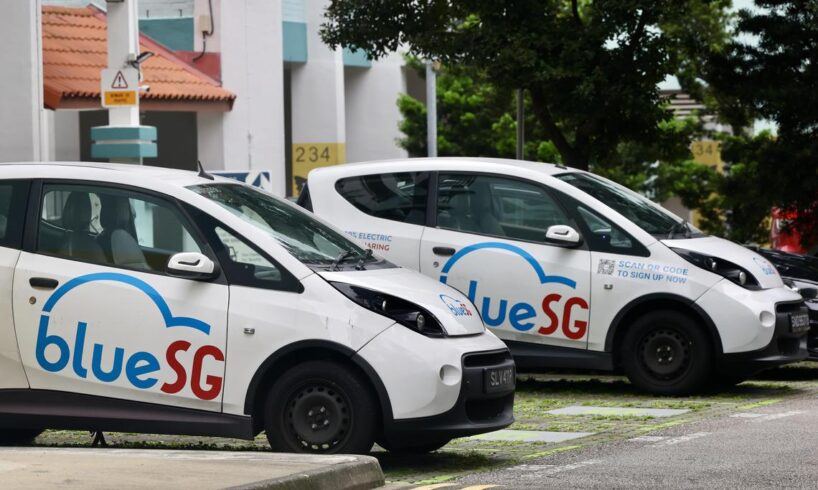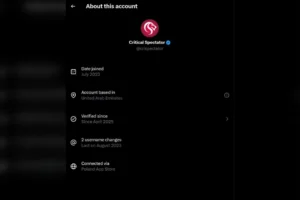
SINGAPORE – The need for robust software to power the service and for better vehicles has been cited by former BlueSG insiders as two possible reasons behind
the electric car-sharing service winding down operations
on Aug 8 and relaunching in 2026.
BlueSG said it was doing so to upgrade its platform – which will include enhanced technology – and refresh its fleet to make the service more reliable and efficient.
The software manages the vehicle fleet, works with the user database and handles payments.
BlueSG switched to its current software in late 2023 from another one that was used since before the car-sharing service was sold in 2021 to Goldbell, a Singapore-owned company known for commercial and industrial vehicle leasing.
This was because the rights to use the previous software expired, Mr Ng Lee Kwang, a BlueSG board director between 2021 and 2023, told The Straits Times.
The new software drew user complaints over issues relating to car bookings and payments, among other things.
Mr Franck Vitte, who founded BlueSG in 2017 and served as its managing director until October 2021, when it was sold, told ST on Aug 5 that the software needed by the car-sharing service is complex to develop and difficult to run reliably.
He said that while it is possible to continue the service and make the switch to a new software platform when it is ready, the company’s decision to take a pause in this way would allow it to focus on developing the planned changes and not be distracted by having to correct bugs.
He also suspects that the developers may have realised that a thorough reworking of the foundations, rather than patching fixes to the software, is needed to ensure that the system will operate smoothly.
Even though there are ready-made, off-the-shelf software solutions, adapting them to the specific requirements of BlueSG will take a lot of work, Mr Vitte said.
These include handling Electronic Road Pricing charges and parking fee payments, and having access to the call centre from the smartphone app.
The vehicle fleet used for the car-sharing service also needs a revamp. The two-door electric cars that launched BlueSG in 2017 are no longer in production, and some of the replacement parts are difficult to source.
Mr Ng said there is a need for newer electric cars that can be charged up faster and have a longer operating range, so that the cars can be used more frequently to generate more revenue and boost profitability.
BlueSG posted a net loss of $31.1 million between January 2023 and March 2024, based on its latest publicly available financial statements.
This is nearly three times the $11.4 million net loss the company incurred in the financial year ended December 2022, according to statements filed with the Accounting and Corporate Regulatory Authority.
The company attributed the losses to the heavy investments made over the years, which were part of its strategy to achieve its growth plans.
It is a marked change of fortune for the firm, which had posted a $1.8 million profit for the financial year ended December 2021.
BlueSG is Singapore’s first electric-only car-sharing service. Its launch in 2017 was supported by the Land Transport Authority and the Economic Development Board.
The car-sharing service has two types of electric vehicles in its fleet: a compact two-door hatchback, a specially built model for BlueSG that entered service in 2017; and the Opel Corsa-e, a larger, four-door hatchback, which was introduced in 2022.
BlueSG’s revenue leapt to $21.1 million in 2021, from $14.3 million in 2020. Revenue continued to rise steadily to $23 million for the 12 months ended December 2022, and to $24.6 million in the period from January 2023 to March 2024.
No financial statement was filed for the 2023 financial year.
Responding to ST’s queries, BlueSG chief executive Keith Kee said the figures must be viewed in the context of the company’s “deliberate, front-loaded investment strategy”. He added that the company has invested about $70 million over the past years to build up BlueSG.
“We committed to scaling the business in a way that would support long-term growth, and made a conscious decision to invest ahead of the curve, fully aware that it required upfront capital commitment,” said Mr Kee.
In its 2021 announcement about its plans for BlueSG, Goldbell said it planned to invest more than $70 million over five years to grow the car-sharing service’s fleet and back-end technologies to boost operational efficiencies and customer experience. Goldbell also aspired to take BlueSG to other cities in the Asia-Pacific.
The car-sharing company said its relaunch in 2026 will see an upgraded platform, a refreshed car fleet and more locations for users to rent and return cars. The company is also laying off an undisclosed number of staff.
The latest available financial statement, which is for the January 2023 to March 2024 period, showed that BlueSG’s costs came to $40.3 million – 46 per cent more than the $27.6 million incurred in the period from January to December 2022.
This was due to factors such as the cost of insurance, maintenance and storage of its electric vehicle fleet, which came up to a combined $9.3 million, 42.9 per cent more than 2022’s figure of $6.5 million.
BlueSG said it has a fleet of “almost 1,000 electric vehicles” and more than 1,500 charging points. Since it was acquired by Goldbell, its subscriber base has grown from 140,000 to more than 250,000, but it declined to say how many users are active.
BlueSG is unique among car-sharing services in Singapore because the hired car does not have to be returned to the same location from where it was rented out.
Using the service involves signing up as a member and booking a car over a smartphone app.
The app also unlocks and starts the car. The service is charged on a per-minute basis, instead of larger 30-minute or hourly blocks, which are more common.





